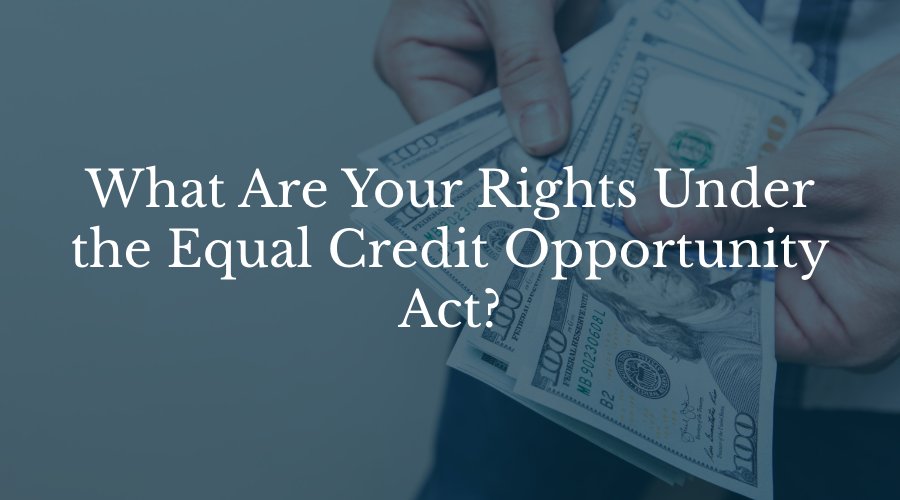20+ year of experience
Insurance Defense Lawyers
Personal attention
Eager to Protect our Clients Find out if you have a case Find out if you have a case
Explaining Your Equal Credit Opportunity Rights
You have rights when borrowing money, investing, or using your bank account. These laws protect you from discrimination, ensuring that you have the same ability and access to funds as anyone else. That does not always happen, though. A good starting point is to explain your Equal Credit Opportunity Act rights and what they mean for your future.
Before doing that, know that you also have access to legal help when you find yourself being discriminated against or otherwise abused. If you find yourself in that situation, our Florida credit report error attorney at Sharmin & Sharmin Attorneys at Law are committed to helping you. Contact us for a free consultation.

What Are Your Rights Under the Equal Credit Opportunity Act?
The Equal Credit Opportunity Act [ECOA], 15 U.S.C. 1691 et seq. put in place very specific rules about how creditors can make decisions about lending. In short, It bars discrimination against applications based on all of these protected classes:
- Race
- Color
- Religion
- National origin
- Sex
- Age
- Marital status
- Receiving income from public assistance programs
- Or if a person exercises their rights under the Consumer Credit Protection Act
What does this mean to you, though, if you are applying for a loan and are denied? Not every situation will relate to discrimination, but when you believe that is the case, you have the legal right to pursue legal action against that party. The Department of Justice takes these claims seriously, but you also have the ability to seek financial compensation if you can prove your losses.
What Does the Equal Credit Opportunity Act Require?
This law prohibits any creditor from discriminating against any aspect of a credit transaction. It includes all types of organizations that offer credit. That includes smaller companies, financing companies, large credit card companies, banks, credit unions, credit card lenders, and retail stores. A lender cannot discriminate when considering the following:
- Whether to lend someone money
- What the terms of that credit are
It also applies to all types of loans, not just credit cards. This includes personal, unsecured loans, mortgages, small business loans, student loans, and car loans. Also, if you are considering a loan modification or refinance, this law applies to this area as well.
What Your Rights Say
Under the Equal Credit Opportunity Act, your rights remain protected in various situations. Here are some specific rights you are given, but this is not a full list.
- You have the right to maintain your accounts if you make the decision to change your name, which may be due to any reason.
- You have the right to maintain your existing credit even after you reach a specific age or retire unless you are unable to make payment.
- When making the decision about lending, the credit application can only use financial factors to make such decisions. That includes your credit history, your income, your expenses, and your credit score.
- Every creditor must send you a letter or otherwise inform you of whether your credit application was accepted or rejected within 30 days of applying for it.
- If you do not receive the loan and your application is denied for any reason, the lender is required to inform you of the reason why if you ask them to do so – within 60 days.
Creditors have a number of additional rules they must follow when it comes to issuing credit. For example, they cannot base interest rates, terms, or other factors on anything other than financial information. That means, for example, they cannot charge you a higher interest rate based on your sex, race, or other protected status.
They also cannot refuse to provide you with a loan or other financial service based on your acceptance of public assistance. That means that if you are receiving public assistance, they have to treat those funds in the same exact way as they would any other income.

How Do You Know Your Lender Discriminated Against You?
This is the challenging part of the process. Working with a consumer credit-focused attorney allows you to uncover evidence that this may have happened. It can be challenging to do so, but there are several key factors we look for when trying to determine if this happened.
- You received different support or treatment when you visited the lender in person after speaking to them over the phone.
- The lender warned you not to apply, perhaps discouraging you, stating, “You probably do not qualify for a loan…”
- When you are applying for a loan, such as at a car dealership or a bank, you hear the lender making comments about a protected classification, as listed here
- You did not receive a reason for the denial of credit even though you asked for it
- You believe you received a loan with an interest rate that was unnecessarily higher than what you qualified for (perhaps based on equal factors from other applications)
- The lender asked about your marital status if you are applying for a loan as a single person even though you are married
- Not accepting your public assistance documentation as a source of income
- Pressure or feeling forced to accept a loan at a higher interest rate
What Should You Do If You Feel You Were the Victim?
In situations like this, it is very difficult to know what your next step should be. You have the right to file a complaint with the creditor and do so through a third party, not the person you were speaking to while the events took place. At the same time, write down what happened to you, and document the details of the entire transaction. Often, the right thing to do is to contact the Attorney General in your state to file a discrimination claim.
Let Our Team Go to Work for You Now
You have rights under the law. As we explain your Equal Credit Opportunity rights, know that we are also here to defend you against violations. Reach out to us now. Let our team at Sharmin & Sharmin Attorneys at Law provide you with insight into what your legal options are right now. Call us today to schedule a free consultation.
Find out in 3 easy steps if you have a case.
All fields are required. If you need immediate assistance, do not hesitate to call us at (1-844) 742-7646